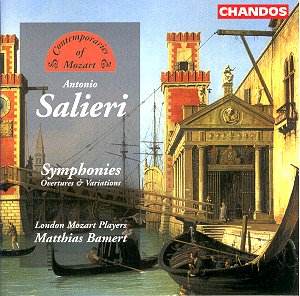Antonio SALIERI (1750-1825)
Overture to "Cublai, gran kan de Tartari"
26 Variations on "La folia di Spagna"
Overture to "Angiolina, ossia Il Matrimonio per sussuto"
Sinfonia Veneziana
Overture to "La locandiera"
Sinfonia "Il giorno onomastico"
Overture to "Falstaff, ossia Le tre burle"
 London Mozart Players conducted
by Matthias Bamert.
London Mozart Players conducted
by Matthias Bamert.
rec All Saints, Tooting, London - 10-11 April, 2000.
 CHANDOS CHAN 9877
[65.41]
CHANDOS CHAN 9877
[65.41]
Crotchet
AmazonUK
AmazonUS
Amazon
recommendations

This disc is another in Chandos's ongoing series of works by composers who
were contemporaries of Mozart. Going by the number of issues that have appeared,
this series must have been quite successful. Of late there has been a gradual
tailing off of the number of discs. Maybe the number of 'available'
contemporaries is getting fewer. No matter, given Salieri's eminent position
in musical history, particularly with respect to Mozart's life, I am surprised
that it has taken Chandos this long to reach him.
Salieri was primarily an opera composer at the beginning of his career right
through to his later years when he concentrated primarily on church music.
What we have on this disc is primarily from operatic sources plus some other
works. There are four opera overtures, a set of variations, and two symphonies
though one of these is a collection of operatic sinfonias and other pieces
put together by Salieri's first modern editor Pietro Spada.
As with many works of this era, the overture would normally be a pot-pourri
of tunes to be heard later in the opera, rather than a sound picture summarising
the whole nature of the work as became more prevalent with later composers.
The four operas represented here are "Cublai" (Kubla, the great Khan of the
Tartars), "Angiolina" (Angiolina, or Marriage through whispering), La locandiera
(The Landlady), and Falstaff (Falstaff, or the three hoaxes). Apart from
the thematic relationship with the following works, these overtures could
probably be swapped around with no real loss. No matter, they are all extremely
tuneful, and display a high degree of skill in the orchestral writing, and
in creating pleasant tunes.
The only symphony on this disc, written by the composer in 1775, was inscribed
"Sinfonia initiolata Il giorno (o)nomastico…eseguita in un giardino
nel mese d'agosto dell'ano sudderto" (Symphony entitled Name Day composed
in a garden in the month of August of the year noted below). With titles
like this who might be surprised at Salieri's level of popularity! It is
a three movement work lasting just under eighteen minutes. In fact, I found
it to be an extremely attractive work to listen to. Salieri's editor Pietro
Spada arranged it from some shorter pieces, all from operas. The first movement
came from the overture to the opera La scuola de' gelosi (The school for
jealousy), the second and third movements coming from the overture to La
partenza inaspettata (The unexpected departure). How the work came about
is no matter, it is very pleasant, lasting just under ten minutes, and well
worth hearing.
The disc is finished off by the 26 Variations on "La folia di Spagna", and
for me this was the one work on the disc which I would not be too bothered
if I did not hear again. No matter that the theme was used as the source
for variations by Frescobaldi, Lully, Corelli, Alessandro Scarlatti, Vivaldi,
C.P.E. Bach, Cherubini, Liszt, Nielsen and Rachmaninov. Whilst 26 very short
variations taking on average less than a minute each is a showcase for the
composer's skill, it takes a robust constitution to sit through these one
after the other. The one compensation is that there is only less than a minute
each - think how it would sound if the work was twice or three times the
length.
The entire project has been performed by the London Mozart Players under
Matthias Bamert, and we can admire this combination for their superb performances
aided and abetted by Chandos's superb recordings.
To sum up then, a very worthy member of Chandos's series, tuneful, superbly
played and recorded, and will give pleasure to all who purchase it. I enjoyed
it very much.
John Phillips

